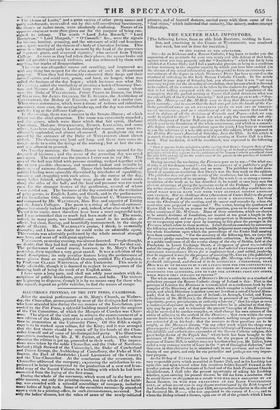ILLUSTRIOUS PRINTERS, OF THE PITT PRESS, CAMBRIDGE.
After the musical performance at St. Mary's Church. on Wednes- day, the Chancellor, accompanied by most of the distinguished visiters who have attended him during the ceremonies of the Installation, pro- ceeded to the Pitt Press, a splendid building reared under the auspices of the Pitt Committee, of which the Marquis of Camden was Chair- lam". 'f he object of the visit was to witness the commencement of a new edition of the Bible, printed in a novel style, which has been some time in preparation at the University Press. Of this Bible a single copy is to be worked upon vellum, for the King ; and it was arranged that the first sheets should be struck off by the hands of the Chan- cellor himself and of some of his distinguished party. The illustrious Opel owes. conducted by Mr. J. W. Parker, of London, tinder whose direction the edition is got up, proceeded to their work. The impres- sions were taken by the noble Chancellor, and the Duke of Northum- berland ( High Steward of the University), the Duke of Cumberland and ['drive George, the Archbishop of Cantetbury, the Duke of Wel- lington, the Earl of Hardwicke (Lord Lieutenant of the County), and the Vice-Chancellor. At the conclusion of the ceremony, the Clutneellor addressed the company; expressing the satisfaction he ex- perienvel in being instrumental to the production of a new and beau- tiful copy of the Sacred Volume, in a building with which be had been S3onnected from the laying of the first stone. During the whole of the ceremony, which went off in the best pos- lade manner, not only the printing-rooms, but the whole of the build- ing. WIIS crowded with a splendid assemblage of company, including inany ladies of high rank. Some of the casualties necessarily attendant upon a visit to a printing-office, in such circumstances, occurred. Not only the ladies' dresses, but the robes of some of the newly-initiated printers, and of learned doctors, carried away with them some of the "foul stains," which indicated that curiosity, like misery, makes strange fellowships.


























 Previous page
Previous page